Salem is surely Bewitched; perhaps Bothered but certainly not Bewildered!
Witches are so hard to Resist
Salem has, since Arthur Miller's acclaimed play The Crucible, been synonymous with witches, and the beautiful Federal/ Adamesque 18th century town's inhabitants accept there is little chance of escape. Many traders succeed in their businesses solely on the strength of it and many others hopelessly just wish it would go away - like the Peabody Essex Museum with its speciality in Chinese art derived from the town's late 18th/ early 19th century mercantile success there following Independence, and the trustees of the home and memorabilia of US novelist Hawthorne of Scarlet Letters and House with Seven Gables fame. [Hawthorne was of course a direct descendant of presiding magistrate Hathorne from the Witch Trials and added the 'w' to his name deliberately to distance himself as much as possible!]
Arthur Miller's Crucible Credited with Creating Town's Contemporary Fame
Arthur Miller penned his work at the height of US Senator Macarthy's legendary 'communist witch hunt' in the 1950s but the analogy was with Salem's hysterical outburst at the end of the 17th century that saw twenty in all including a Minister of Religion put to death and more than a hundred others charged with witchcraft over a period of less than a year. Notwithstanding Apologies from one of the Magistrates and all of the Jurors, a Confession by one of the prime accusers as a young girl, a Remembrance Day instituted by the State of Massachusetts in 1707 and finally a contemporary Pardon by the Governor, many still believe the sequence of events can be permanently presented as an outstanding instance of the hysterical persecution of minorities that can afflict any community at almost any time.
The town's leading witchcraft museum, where Alison D'Amario has been Director of Education for the past 18 years, draws comparisons with the treatment of US citizens descended from Japanese immigrants after Pearl Harbor when tens of thousands were deprived of all their rights and interned; with Gays following AIDS outbreaks; and with Muslims following the 9/11 destruction of New York's twin towers. [Alison is shown in the tercentenary memorial ground at Salem with Lady Prestoungrange].
Click on all images to enlarge
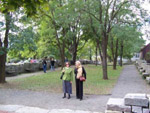 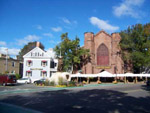  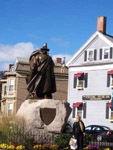
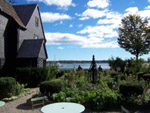 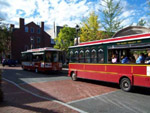 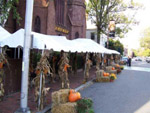 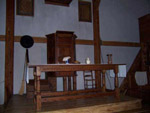
Witch Tourism Explosion
But deep down there is the endless fascination with witchcraft in so many of us which accounts for the phenomenal success of Salem's Witch Tourism. Visitors come from near and far and never more so than during the month of October leading up to Hallowe'en. A permanent Wyken community is present in the town practising the ancient pagan rites of their religion of which Hallowe'en is one of their greatest festivals. Countless souvenir shops offer every bauble from pumpkin related artefacts, pointed hats, broom sticks and feline accessories to humourous parking notices, academic and less than academic tomes. Hallowe'en Balls abound and Ghost Houses and Witches' Dungeons are in place to scare those who wish to be scared.
Most recently the late Elizabeth Montgomery, the tv and movie star in Bewitched had been remembered in the town centre in a fine statue.
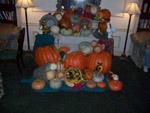 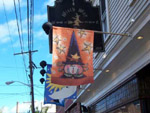
 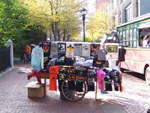 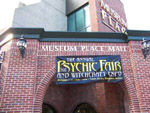
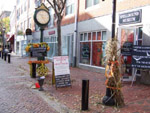 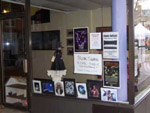 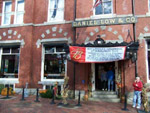
 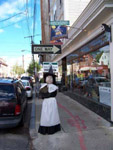 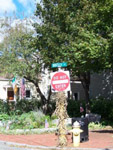 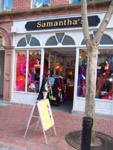
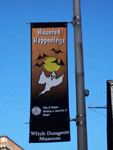 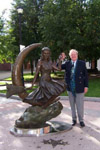 
On Not Letting Pandora's Syndrome Loose in Prestonpans
The exchange meetings that the Prestoungrange Arts Festival has had with Alison D'Amario and her colleagues, both in Prestonpans, Scotland and in Salem MA this year have all been directed at exploring how to keep witchcraft in a perspective that is acceptable to the townsfolk whilst taking very considerable advantage of its unique tourism attractivity. Additionally Prestonpans also has other very strong tourism attractions such as the famous victory there in 1745 by Bonnie Prince Charlie over the Hanoverian redcoats led by Sir John Cope. Further exceptionally important elements of Prestonpans history are its unique 18th and 19th century pottery, its coal mining and brick making heritage, its salt panning, oyster beds and local brewing traditions.
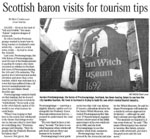
Past Role and Present Anguish of the Kirk
Finally, there is the very real necessity to examine the role of the Kirk in Prestonpans, and across Scotland at large, in the persecution of witches. That has to be set forth with a fair yet fearlessly honest perspective. In Salem it is reported by the Museum's leaders that this issue has not to their knowledge caused concern - but they have come fom Roman Catholic, Greek Orthodox and Scottish Episcopalian families. In Prestonpans some specific anguished concerns have alas already surfaced.
Published Date: October 17th 2005
|





